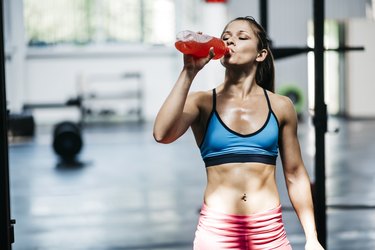
When it comes to staying adequately hydrated and fueled during a sports match or after falling under the weather, there's often the debate of Propel vs. Gatorade. Both beverages are chock-full of electrolytes, but what's the real difference between the two?
Reasons to Consume Sports Drinks
Video of the Day
Before discussing the difference between Propel and Gatorade, let's first discuss why people reach for sports drinks in the first place. It's simple: electrolytes.
According to MedLinePlus, electrolytes are electrically-charged minerals in the body that help balance hydration and the body's acid/base, or pH, level. Electrolytes also help move nutrients into cells, and waste out of them.
Video of the Day
Common electrolytes include calcium, chloride, magnesium, phosphate, potassium and sodium. Of these, sodium is particularly important, which is why it's a major ingredient in sports drinks. According to MedLinePlus, sodium plays a vital role in nerve and muscle function. It helps to prevent cramps and boosts physical output overall, which is why it is included in both Gatorade and Propel.
To help stay adequately hydrated, keep in mind that the 2015-2020 Dietary Guidelines for Americans recommend that adults should consume 2,300 milligrams of sodium per day. A single serving of most sports drinks, Gatorade and Propel included, typically accounts for only one-tenth of this allotment.
Read more: The Benefits of Electrolytes in Water
Difference Between Propel and Gatorade
While Propel and Gatorade may seem incredibly similar, given their abundance of electrolytes, their nutrition labels tell another story. Yes, they both contain electrolytes, but Propel has noticeably more ingredients than Gatorade.
Of course, that's not necessarily a bad thing — especially given that Propel contains a variety of vitamins, including vitamin B3, vitamin B5, vitamin B6 and vitamin E. Gatorade doesn't have these nutrients. According to MedLinePlus, these B vitamins help create and store more energy from the food we eat — something that's particularly essential during sporting events and when overcoming illness (two times for which electrolyte beverages are particularly popular).
On the converse, Gatorade contains red dye and caramel color, which are controversial ingredients that most nutritionists recommend doing without. According to The Center for Science in the Public Interest, red 40 can lead to hyperactivity in children. Additionally, Consumer Reports points out the caramel color (which is also added to many sodas) is potentially carcinogenic.
Read more: Negative Effects of Drinking Too Many Electrolytes
Propel vs. Gatorade Calories
Specific ingredients aside, the Propel vs. Gatorade debate also comes down to calories and specific nutrient doses. According to the Gatorade website, a classic 20-ounce bottle of Gatorade Fruit Punch Thirst Quencher has 140 calories, 36 grams of carbohydrates (all of which are sugars), 270 milligrams of sodium and 75 milligrams of potassium.
Given that the American Health Association recommends adult women should eat no more than 100 calories of sugar per day (or 25 grams of sugar) and men should eat no more than 150 (or 38 grams), this isn't a great.
Gatorade Zero, on the other hand, has 10 calories per 20-ounce bottle, comprising 270 milligrams of sodium, 75 milligrams of potassium and only 1 carbohydrate. Therefore it's a much better option if you want to stay within the Gatorade family without pounding down the sugar. Best of all, like its classic cousin, it's available in a variety of flavors, including orange, lemon lime, glacier cherry, glacier freeze and berry.
Then there's Propel, which has 0 calories per 20-ounce bottle, 270 milligrams of sodium and 70 grams of potassium. Additionally, it accounts for 35 percent of the daily recommended dose of vitamin C, 20 percent of vitamin E, 80 percent of niacin, 70 percent of vitamin B6 and 120 percent of pantothenic acid daily dose recommendation.
- MedLinePlus: "B Vitamins"
- MedLinePlus: "Fluid and Electrolyte Balance"
- MedLinePlus: "Sodium Blood Test"
- Center for Science in the Public Interest: "Food Dyes"
- Consumer Reports: "Caramel color: The health risk that may be in your soda"
- Gatorade: "Thirst Quencher"
- American Heart Association: "Added Sugars"
- Gatorade: "Gatorade Zero Sugar Thirst Quencher"
- Propel: "Flavored Electrolyte Water Watermelon"